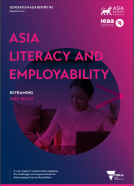Generation Asia Report | Asia Literacy and Employability


This report provides unique, data-informed insights into the diversity of young Australians; their Asia-related skills and knowledge; and the potential of young people from across the Asia Pacific who are living, studying and working in Australia. This report reframes ‘Asia literacy’ and broadens perspectives of what Asia literacy means, how it can be measured and how it links to employability.
Key Findings
- We must recognise and champion diverse forms of Asia literacy in our young people; equip employers to value these skills; and support opportunities to learn about and experience Asia beyond formal study and throughout careers.
- For example, more Australians – including citizens and non-citizens, across all age groups – are using languages other than English at home, including Asian languages.
- 410,000+ Australian citizens, aged 18 to 35 years, use an Eastern, Southern or Southeast Asian language at home, which is more than the combined population of Hobart and Darwin.
- In NSW, VIC and the ACT, at least 1 in 10 Australian citizens, aged 18 to 35, use an Asian language at home.
- Nationally, the most used Asian language at home by Australian citizens aged 18 to 35 years is Mandarin, followed by Vietnamese, Cantonese, Punjabi and Hindi. Tagalog and Filipino, when combined, account for nearly 31,000 language users which would place them fourth nationally:
- The usage of Asian languages by young Australians differs across states and territories. Mandarin leads in the ACT, NSW, QLD and WA; Vietnamese in SA and VIC; Tagalog in the NT; and Nepali in TAS.
- Between 2014 to 2019, the number of Australian undergraduates studying in the Indo-Pacific increased by 83%, from 8,437 students to 15,440 students, with the Australian Government’s New Colombo Plan a key driver.
- Only 21 out of 2,300+ postgraduate coursework programs offered by Australian universities offer an Asia-focused specialisation, highlighting an opportunity to support life-long learning opportunities related to Asia.
- ‘Employability’ is a useful framework through which to consider Asia literacy and employment in Australia. In addition to academic disciplines, Asia literacy is a set of achievements that enhance the employability of young people in Australia.
- There are opportunities for greater business engagement in young Australians’ Asia literacy. We need to better understand demand for Asia literacy in Australian workplaces, particularly for graduate, entry-level and early career positions
This research venture is presented in partnership with


Acknowledgements
This project is co-led by Eloise Dolan, Program Manager and Generation Asia Lead, Asia Society Australia, and Dr Kirrilee Hughes, Research Manager, International Education Association of Australia.
This project is overseen by an esteemed steering group chaired by Professor Ren Yi, Pro Vice-Chancellor (International), University of Southern Queensland and IEAA Board Member, and comprising:
- Rebecca Hall, Commissioner for Victoria to South East Asia
- Philipp Ivanov, CEO, Asia Society Australia
- Professor Ly Tran, Melbourne Asia Game Changer Awardee and School of Education, Deakin University
- Dr Davina Potts, Director Future Students, The University of Melbourne
- Jon Chew, Head of Strategic Insights and Analytics, Navitas
- Rebecca Cozens, PhD Candidate, Griffith University and representing IEAA Young Professionals

